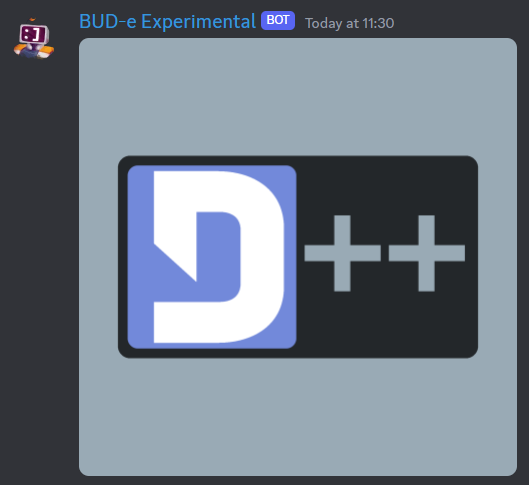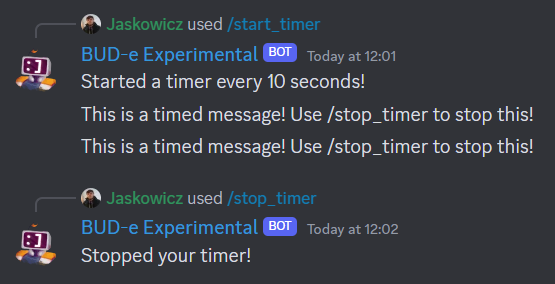 |
D++ (DPP)
C++ Discord API Bot Library
|
 |
D++ (DPP)
C++ Discord API Bot Library
|
Timers are a great way to run something every x seconds, from setting the bot's status, to maybe even doing a http request! Luckily, D++ makes this incredibly easy by providing an easy-to-use timer system! This tutorial will show you a couple examples on how to use timers!
First, we'll cover sending the D++ logo every 10 seconds!
#include <dpp/dpp.h> int main() { /* Create the bot */ dpp::cluster bot("token"); bot.on_log(dpp::utility::cout_logger()); bot.on_ready([&bot](const dpp::ready_t& event) { /* Create a timer when the bot starts. */ bot.start_timer([&bot](const dpp::timer& timer){ /* Create a timer when the bot starts. */ bot.request("https://dpp.dev/DPP-Logo.png", dpp::m_get, [&bot](const dpp::http_request_completion_t& callback) { /* Create a message to our desired channel, with the D++ logo. */ bot.message_create(dpp::message(1140010849432522843, "").add_file("image.png", callback.body)); }); }, 10); /* Do it every 10 seconds. Timers also start with this delay. */ }); bot.start(dpp::st_wait); }
If all went well, you should get the D++ logo sent every 10 seconds to your desired channel!

Now, let's make the same timer a one-shot timer, meaning it will only run once!
#include <dpp/dpp.h> int main() { /* Create the bot */ dpp::cluster bot("token"); bot.on_log(dpp::utility::cout_logger()); bot.on_ready([&bot](const dpp::ready_t& event) { /* Create a timer when the bot starts. */ bot.start_timer([&bot](const dpp::timer& timer) { /* Create a timer when the bot starts. */ bot.request("https://dpp.dev/DPP-Logo.png", dpp::m_get, [&bot, timer](const dpp::http_request_completion_t& callback) { /* Create a message to our desired channel, with the D++ logo. */ bot.message_create(dpp::message(1140010849432522843, "").add_file("image.png", callback.body)); /* Stop the timer by passing the timer handle in. */ bot.stop_timer(timer); }); }, 10); /* Do it every 10 seconds. Timers also start with this delay. */ }); bot.start(dpp::st_wait); }
Great! Now we've learnt the basics of timers and how to stop them!
To finish off, let's make a timer that you can start and stop with commands. This example will store the timer in a map where the user is the owner of the timer!
#include <dpp/dpp.h> std::map<dpp::snowflake, dpp::timer> user_timers{}; int main() { /* Create the bot */ dpp::cluster bot("token"); bot.on_log(dpp::utility::cout_logger()); /* The event is fired when someone issues your commands */ bot.on_slashcommand([&bot](const dpp::slashcommand_t& event) { /* Check which command they ran */ if (event.command.get_command_name() == "start_timer") { /* Does user_timers contain the user id? */ if (user_timers.find(event.command.usr.id) != user_timers.end()) { event.reply("You've already got an in-progress timer!"); return; } /* Create a copy of the channel_id to copy in to the timer lambda. */ dpp::snowflake channel_id = event.command.channel_id; /* Start the timer and save it to a local variable. */ dpp::timer timer = bot.start_timer([&bot, channel_id](const dpp::timer& timer) { bot.message_create(dpp::message(channel_id, "This is a timed message! Use /stop_timer to stop this!")); }, 10); /* * Add the timer to user_timers. * As dpp::timer is just size_t (essentially the timer's ID), it's perfectly safe to copy it in. */ user_timers.emplace(event.command.usr.id, timer); event.reply("Started a timer every 10 seconds!"); } if(event.command.get_command_name() == "stop_timer") { /* Is user_timers empty? */ if (user_timers.empty()) { event.reply("There are no timers currently in-progress!"); return; } else if (user_timers.find(event.command.usr.id) == user_timers.end()) { /* Does user_timers not contain the user id? */ event.reply("You've don't currently have a timer in-progress!"); return; } /* Stop the timer. */ bot.stop_timer(user_timers[event.command.usr.id]); /* Remove the timer from user_timers. */ user_timers.erase(event.command.usr.id); event.reply("Stopped your timer!"); } }); bot.on_ready([&bot](const dpp::ready_t& event) { if (dpp::run_once<struct register_bot_commands>()) { /* Create a new global command on ready event. */ dpp::slashcommand start_timer("start_timer", "Start a 10 second timer!", bot.me.id); dpp::slashcommand stop_timer("stop_timer", "Stop your 10 second timer!", bot.me.id); /* Register the commands. */ bot.global_bulk_command_create({ start_timer, stop_timer }); } }); bot.start(dpp::st_wait); }
If that went well, it should work something like below!

Great, now you've learnt how to store timers to manage at a later point!